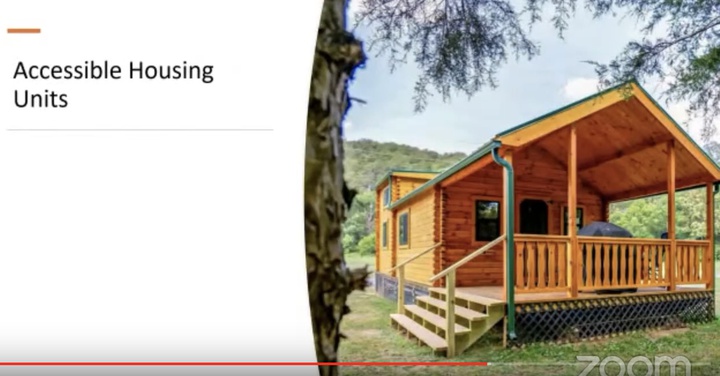Jessica Cejnar Andrews / Wednesday, July 3, 2024 @ 1:22 p.m.
Crescent City Pursues Coastal Conservancy Grant For RV Park Upgrades, Though Cash Flow Issues May Require Bridge Loan

An example of one of the pre-fabricated cabins Coastal Conservancy dollars could pay for at Crescent City's Lighthouse Cove RV Park. | Screenshot
Crescent City is pursuing a California Coastal Conservancy grant to make upgrades to its Lighthouse Cove RV park.
The goal is to use the $835,000 to provide accommodation to those who may not own an RV or who may need accommodations through the Americans With Disabilities Act, City Manager Eric Wier told the City Council on Monday.
But because the grant is administered through reimbursements, the city’s cash flow is a concern, Wier said. The RV park currently has a working capital balance of roughly $500,000, though there was some discussion about using that to rehabilitate the restrooms, he said.
“Depending on how expenditures come in and what our working capital balance does, we might need to be talking to our financial advisors on this as well as US Bank and look at possibly a bridge loan to make this happen,” Wier told councilors. “Finances are tight with cash flow because of the millions of dollars in grants [we have] and the funding reimbursement time.”
This new grant opportunity comes from the Coastal Conservancy’s Explore the Coast Overnight program. In addition to rehabilitating the park’s restrooms, city staff propose upgrading an existing apartment to make it ADA accessible. This would allow the city to offer it to the public, according to Wier.
City staff also propose using grant dollars to install two pre-fabricated cabins at roughly 400 square feet each alongside Elk Creek. Wier pointed out that this would give people an opportunity to stay at the park even if they didn’t have an RV and especially if they weren’t into tent camping.
According to the city’s staff report, the Coastal Conservancy’s Explore the Coast Overnight program stems from Assembly Bill 250, which passed in 2017 and directed the conservancy to create low-cost coastal accommodations.
The program was allocated $30 million in Proposition 68 dollars. Most grants will be between $200,000 and $5 million, though there are no maximum or minimum grant amounts for this funding, according to the staff report.
Crescent City is pursuing this funding at a time when it has received about $15.6 million total in grants over the last roughly four years. These dollars are paying for Beachfront Park’s expansion and the reconstruction of Front Street in addition to several smaller projects.
Most of these grants are paid to the city through reimbursements, Wier told the Wild Rivers Outpost on Wednesday. Though the city isn’t necessarily required to provide a contribution for most of those grants.
But if those reimbursements don’t come within 60 to 90 days of each other, Crescent City will have to pay project contractors without having those grant dollars on hand, Wier said.
Previously, when the city used grant dollars to make upgrades at the RV park, if cash flow became a concern it could borrow from the general fund. Crescent City would be reimbursed for the project through the grant and the general fund would then be made whole, Wier said.
“Given everything the general is going through [during] this timeframe, cash flow is a concern,” he said.
On Monday, Wier said the rates for the cabins would be a bit more than the cost to rent space for an RV since there’s the need to cover the utilities as well as cleaning the cabins. Staff will “run the numbers” again before returning to the City Council with proposed rates, he said.
“The Council will be the ones that set those rates, but they were somewhere around $125-ish,” he said. “Those are preliminary numbers. That’s something we’d have to [bring] back.”
According to the city’s staff report, staff expect to find out if their grant application was successful in September and will start the project in October for completion in November 2026.
Crescent City Mayor Blake Inscore compared a possible stay at a Lighthouse Cove cabin to his experience at a KOA in West Yellowstone.
“A unit just like this in that same park rented for $265 a night and so I think what we may discover is that we have an opportunity to generate revenue,” he said. “If we ever want to take Lighthouse Cove to be a resort park versus a nice RV park, we’re going to have to be able to generate a higher return on investment. I think we’re going to discover that these two units along with the apartment will provide revenue at a much different scale.”
CLICK TO MANAGE